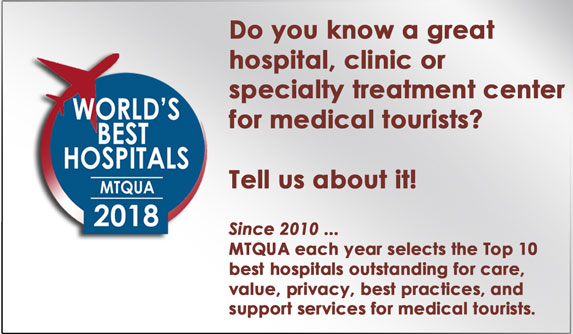 Are you killing your online reputation and don’t know it?
Are you killing your online reputation and don’t know it?
Like it or not, in medical tourism your online reputation defines you as a professional and as a business.
Ignoring it may be putting your professional life in jeopardy. Branding, especially how to build a brand, is a popular subject at medical tourism conferences. But how to practically manage and protect your online brand is usually not discussed. When it is, the presentation seldom focuses on the problems faced by small businesses like clinics, medical practices or medical travel facilitators.
Your Online Reputation Is Your Brand
For providers and practitioners who are small businesses, a brand is generally the reputation of the individual doctors, specialists, or facilitators. They – and their livelihoods – are more vulnerable than hospitals or large institutions when their reputations are threatened online in forums, chat rooms, news reports and rating sites.
Your Online Reputation Can Be Destroyed In Minutes
It takes only a few bad comments, posts, or blogs to ruin reputations that have been years in the making.
Medical tourists, more than any other health care seekers, have to rely on online sources to determine what country to travel to, which doctor or surgeon to see, what treatment to get, and what services a hospital or facilitator might provide.
Their dependence on the internet makes it critical for doctors and facilitators to effectively manage their online reputations and brands even though they may not have the financial or manpower resources of larger businesses to deal with a bad review, a bad article or disgruntled patients.
Build, Watch, And Manage Your Online Reputation
It is time to manage your online reputation. Take the time now to do an inventory of the information that is out there about you and your practice or service online. What is out there? Is it the information you want people to find? Is the information out there even true?
Managing an online reputation requires monitoring the online conversations others are having about you, and using social networks and online marketing experts to promote the brand in the best way possible.
Start with these 5 basic steps to monitor and power up your online reputation and brand.
1. Find Your Reputation Online
Google offers several ways to watch your reputation. Use Google for news and blog alerts. If you are not tech-savvy, you can easily create a Google alert for news and blogs that mention your brand.
Search Google for your brand and related keywords, and occasionally search for key words that might apply to you and your competitors. Study the top results of the search: Is your brand positioned where you want it to be? When it shows up in searches, is it optimized with images and relevant descriptions?
Some review sites can automatically send e-mail alerts when a review of your business is posted.
Also monitor Twitter. Twitter is a popular micro blogging platform and tip sheet for news about your business, your customers and your competitors. Keep track of what is being said about your company with tools like TweetDeck or Twendz.
2. Create The Profile You Want The World To See
After you have found the online conversations about your brand, you will want to build your brand profile on those sites where the conversations are taking place.
If you don’t yet have a LinkedIn profile, what are you waiting for? Patients consider LinkedIn a reliable source for checking your professional background and experience. LinkedIn gives you total control of the content a patient sees about you online.
After LinkedIn, create profiles in the large social networks like Twitter, Google Plus and Facebook as well as local and localized search sites like FourSquare, Yelp, and Citysearch. Even Google Maps and TripAdvisor have forums for customer feedback.
An effective social media presence involves a lot more than whether or not you have a Facebook or a Twitter account. Like any type of public interaction, it demands a thoughtful and strategic approach to make it work for you and your organization.
3. Manage Your Online Reputation And What It Says About You
Now that you can see what others are saying about you, and have established your own profile, you will probably want to manage the brand and manage what others say about it.
Write and/or respond to comments and reviews. A negative review demands special attention. It’s best not to jump in to comment when your emotions are high. Arguing online is like shouting at your neighbor standing in the middle of the courtyard. Everyone can hear you and you look like an idiot.
Be polite, respectful and considerate online. Bullying, arguing and fighting on social media never go away. Your words show up in search long after the incident has otherwise been forgotten. Every comment, every status update, every response is captured and stored on a server someplace for Google to link to it.
Don’t write fake reviews to puff up your business or trash a competitor. Fake reviews are obvious and when publicly exposed, your brand can suffer major embarrassment and even financial penalties.
4. Protect Your Brand And Reputation When In Trouble
You can’t please everyone all the time.
If you spot trouble, get into the conversation early. Speed is vital to stop the momentum of a bad review, report, or comment.
But consider who is saying it. A ranter or troller should be ignored; neither is worth your time. If there’s a mistake, it’s probably worth correcting so that the right facts go on record. If it is an unhappy patient, it is worth your while to rectify the situation as quickly as possible. If someone of note has made a disparaging comment about you, avoid escalating the situation as this can lead to emotional responses that you do not want. Try to deal with the problem off line and return to the online arena once it has been resolved.
If the problem is serious enough, consider taking legal recourse to find a solution. Often, hiring a public relations professional is the best solution. There are also dedicated reputation management companies such as reputation.com that handle monitoring and public relations functions.
5. Use Your Online Brand To Promote And Market Your Services
The online activity about your brand is more than a report card of your reputation. It can also serve as a tool for marketing, research and finding patients.
Look beyond Google AdWords and key word searching. Consider advertising on localized sites. Or creating videos, sponsoring online seminars, hosting real world events. If you are ready to go down this road, find the right expert – don’t assume your office assistant or web site manager knows what to do. Online marketing and reputation management are increasingly more sophisticated and require specialists who can spend your money wisely.
“The bottom line is that the more physicians are active in social media, the bigger their digital footprint will be, and that gives them more control over their online presence.” says Dr. Kevin Pho, blogger on social media for physicians and author of Establishing, Managing and Protecting Your Online Reputation: A Social Media Guide for Physicians and Medical Practices.
3 Tools To Help You Watch Your Reputation Online
It takes only a few bad comments, posts, or blogs to ruin the reputation you have spent years building. Here are 3 tools to help you ensure that your online brand and reputation are where you want them.
1. Google’s Me on the Web
Google has a nice tool that allows you to easily monitor search results for your name. Me on the Web is included in the Google Dashboard. It allows you set up search monitors for your name/brand, assists you in the removal of unwanted content, and can help you manage your online identity.
2. Reputation.com
Reputation.com is a service that allows you to see how you look online. All you do is create a free account. Then you can monitor your online “buzz,” search for and remove any negative information/mentions about you, and find out how you can control what people see when they search for you.
3. Whos Talkin
WhosTalkin.com is a social media search tool that shows you what members of social sites are saying about your name or brand. Using the tool is as simple as entering your name (or brand), clicking search, and waiting for the results.
What other suggestions have you found helpful in managing and growing your online reputation?

 >
>